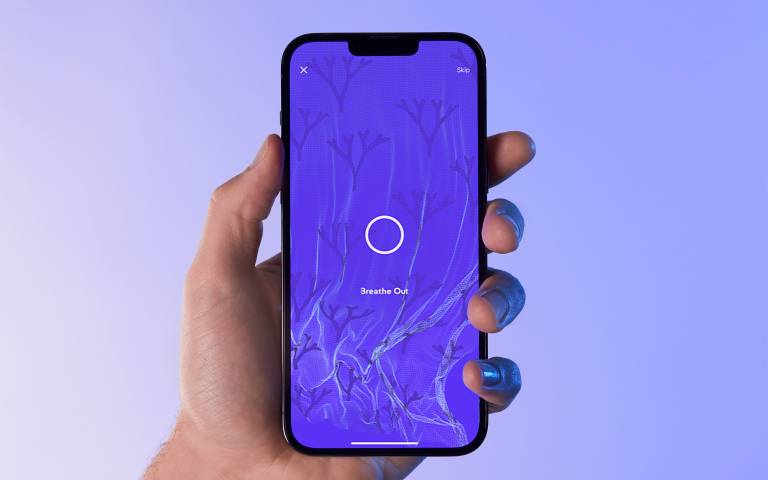Smartphone tech that responds to breathing could benefit asthma, COPD and long Covid patients
30 November 2022
People with respiratory problems could benefit from new technology created by a UCL researcher that uses smartphone sensors to recognise and respond to breathing.

A wellness app - Lungy - created by NHS doctor Luke Hale (UCL Division of Medicine) has been released today (Wednesday 30 November 2022), helping users to self-manage anxiety, stress, sleep problems and training for sports.
The technology uses nature-inspired graphics that respond to breathing in real-time, creating a supportive and immersive environment for people to learn breathing exercises. Now, Dr Hale plans to apply the technology to develop a breathing management platform, Lungy Health, for patients with asthma, chronic obstructive pulmonary disease (COPD) and long Covid.
Lungy, available for iOS download, responds directly to users’ breath and touch, helping them feel more engaged, relaxed and mindful.
The medical device version ‘Lungy Health’, for patients with breathing problems, is under development and due to be released in 2023.
The Lungy and Lungy Health apps are designed to be scalable and accessible platforms for patients to self-manage their symptoms. Teaming up with Professor John Hurst (UCL Division of Medicine), Dr Hale plans to run a clinical study in a group of patients ahead of the release of Lungy Health.
Respiratory disease and mental illness place a huge burden on NHS services and society. Before Covid, the cost of respiratory illness was estimated at £9.9 billion/year (NHS Long-Term Plan), with hospital admissions due to respiratory disease rising at three times the rate of other admissions and 10,000 new diagnoses of lung disease in the UK every week.
Around one in five UK adults experience respiratory symptoms, such as breathlessness, due to diseases like long Covid (affecting over one million people in the UK), asthma and COPD. When done correctly, breathing exercises can be a simple and effective way to improve physical and psychological health, breathing function, exercise tolerance and reduce chest infections.
Existing treatment to teach breathing exercises involves giving patients a worksheet and often an incentive spirometer: a one-use, plastic device that provides resistance to inhaling and encourages deep breathing. Compliance with breathing exercises is generally poor, and demand for respiratory physiotherapists has greatly increased due to Covid, an ageing population and the rising prevalence of respiratory disease.
With further development, Lungy Health could potentially replace plastic incentive spirometers (which are disposable and cost £15-20) by accurately measuring breathing flow and volume. The app will be a remote health platform providing tips on how to improve breathing and patients can easily track their progress and show improvement to their doctor.
Dr Hale started working on Lungy during the first lockdown in 2020. He said: “I started working on Lungy just as the first wave of Covid patients were coming into hospital. It was a very stressful time for everyone – I thought it would be great if people could use their smartphones in a more productive and relaxing way. The way we breathe is linked to both physical and psychological health, so hopefully lots of people can benefit from the technology.”
Luke learned to code and developed a working prototype in the first year and, with support from the NHS Clinical Entrepreneur programme, eventually won funding from Innovate UK and NIHR to further develop the project.
Professor John Hurst (UCL Division of Medicine) said: “I’m really excited by the potential for innovative apps to support self-management for people living with lung disease – I’m impressed by the technology and think patients will love it.”
Lungy and Lungy Health are developed by Pi-A, a startup founded by Dr Hale, and received funding from two competitive Innovate UK grants (Smart Grant & Audience of the Future).
A prototype of Lungy Health has been positively received by consultants, physios and patients.
Joshelyn Torres, aged 30, who tested an early prototype of the Lungy Health app, said: “I started feeling breathless whilst talking to my boyfriend on the phone. I find breathing exercises usually help, so I chose Lungy [Health]. Using the relaxation mode, the visuals allowed me to be distracted from feeling breathless, yet still able to focus on my breathing. After 3-4 breaths, I was relieved.”
In 2020, a 3D printed neck collar designed by Dr Hale and helping transform the lives of people with serious neurological disorders was shortlisted for the prestigious ‘Beazley Designs of the Year'. It is now in the permanent collection of the Design Museum in London.
Video
Links
- Lungy website
- Download Lungy from iOS App Store
- Dr Luke Hale's website
- Professor John Hurst's academic profile
- UCL Faculty of Medical Sciences
- UCL Office of the Vice-Provost (Health)
- Pi-A website
Image
- Credit: Matthew Town.
Media contact
Sophie Vinter
Tel: +44 (0)20 3108 7787
Email: s.vinter [at] ucl.ac.uk
 Close
Close

